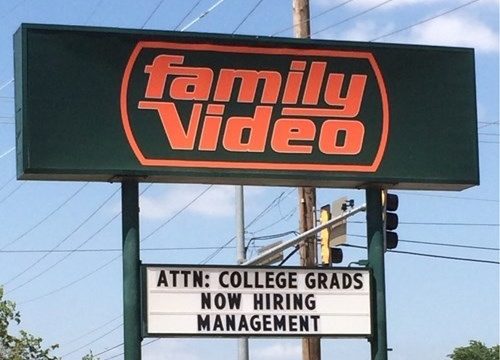Turning Higher Education Into An Entitlement Has Diminished Its Value

Over the years I’ve developed a reputation as a critic when it comes to issues with higher education, and as such friends and readers send me a lot of links and images related to higher education. Which I appreciate. You have no idea how much of what I write about starts with a conversation I have with someone, or an email from one of you readers.
Today the image above landed in my inbox, and I got a good chuckle out of it for obvious reasons. It’s blackly humorous. In an era where higher education has become hugely expensive – both for taxpayers and students alike – to the point where obtaining a degree often means taking on levels of debt that may take a lifetime to pay off, the idea that a degree my qualify you to be management in a video rental store is humorous.
But, to quote Homer Simpson, it’s funny because it’s true.
The foundation upon which the problems with American higher education are built is the idea that every kid should go to college. Parents push this idea with those cliched dreams about their kids becoming doctors or lawyers. Policy makers push it, believing that college education will make for better citizens. The higher education industry pushes because it means more customers for their product.
What this has created is a reality in which attending college – if not obtaining a degree – has become an entitlement. Student loans are issued with little concern for things like credit or whether the degree will enable the student to pay those loans back.
To service this reality, campuses have become much more concerned with the number of students they can pack onto campuses than whether or not those students are ultimately well served by their attendance. Witness the debate in North Dakota over the Pathways to Student Success, a change in policy supported by the State Board of Higher Education. The change would promote more selective admissions in order to ensure that the students who attend North Dakota universities are well prepared and will benefit from the experience.
It faces fierce opposition from some university presidents who are worried that it will hurt enrollment, as Grand Forks Herald editor Tom Dennis noted in an editorial over the weekend.
Those presidents care more about packing their campuses than ensuring that attendance at their institutions is beneficial to the students. That’s a product of the higher education industry becoming little more than a landing pad for all the taxpayer-subsidized tuition that comes with students.
As such, a college degree has become something that’s of diminished value in the work place. Not entirely without value, but not nearly as indicative of achievement as it once was.




